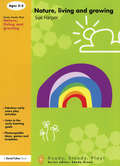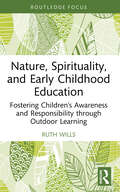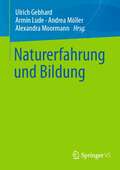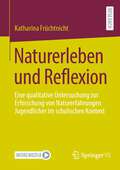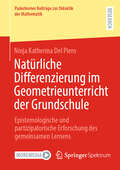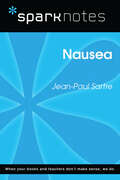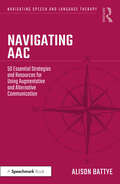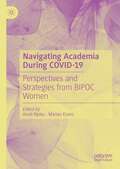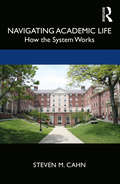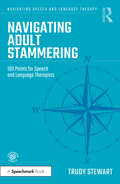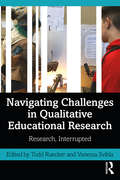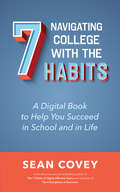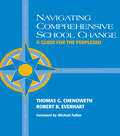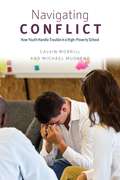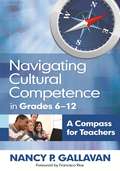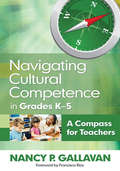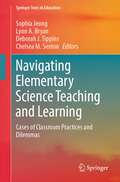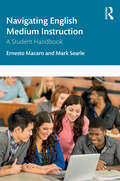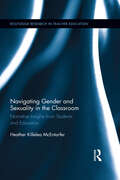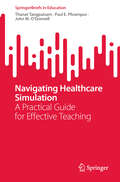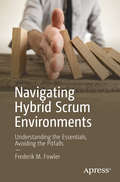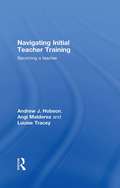- Table View
- List View
Nature, Living and Growing: Nature, Living And Growing (Ready, Steady, Play!)
by Harper SueNature, Living and Growing focuses on outdoor play and how nature can contribute to a child’s learning and development. Split into four sections, which focus on each of the four seasons – spring, summer, autumn and winter, this book: includes activities appropriate to each season offers ideas for 'wander walkabouts' to inspire and set the scene of what the season can offer in regard to play activities promotes knowledge of the environment and how to use natural resources effectively.
Nature, Spirituality, and Early Childhood Education: Fostering Children’s Awareness and Responsibility through Outdoor Learning (Routledge Research in Early Childhood Education)
by Ruth WillsThis novel volume delves into a specific and crucial aspect of early years pedagogy – the intersection between early childhood education and spirituality, offering tips on nurturing spirituality and a sense of connectedness with nature through outdoor learning.With experience both as a scholar and a teacher, the author delves into the ontological and epistemological issues related to outdoor learning and education while keeping accessibility and sustainability at the centre of the volume. Chapters take a comprehensive approach to the exploration of children's innate spirituality and their connection with nature in the context of early childhood education, fusing elements such as a critique of early years policy with philosophy of education and children’s mental health. Using a robust theoretical foundation incorporating philosophical figures such as Froebel, McMillan, Montessori, Dewey and Freire, as well as the inclusion of practical examples from educational settings designed for real-world scenarios, this book reinvigorates the conversation around the holistic development of children by emphasising the importance of nature and child-centred pedagogies.Ultimately exploring avenues that can foster a sense of well-being and social responsibility in children, the book will be of interest to researchers, educators and teacher trainers in the field of early childhood education, environmental education, philosophy of education and teacher education. Policy makers and school leaders may also benefit from this volume.
Naturerfahrung und Bildung
by Ulrich Gebhard Armin Lude Andrea Möller Alexandra MoormannNaturerfahrungen haben positive Wirkungen auf die seelische Entwicklung, Gesundheit und Wohlbefinden und können geradezu als ein Element eines „guten Lebens“ interpretiert werden. In diesem Buch wird dieser Zusammenhang auf Lern- und Bildungskontexte bezogen. Bei Bildungsprozessen geht es nicht nur um die Übernahme von relevanten Inhalten, sondern um eine Berührung, Konfrontation und Transformation des Subjekts. Die zentralen Annahmen dieses Buches sind erstens, dass eben dies durch Naturerfahrungen eröffnet werden kann, und zweitens, dass dies auch (fachliche) Lernprozesse positiv beeinflussen kann.
Naturerleben und Reflexion: Eine qualitative Untersuchung zur Erforschung von Naturerfahrungen Jugendlicher im schulischen Kontext
by Katharina FrüchtnichtKatharina Früchtnicht untersucht auf Grundlage von Kleingruppendiskussionen mit Jugendlichen die Bedeutung von Natur und Erlebnissen in der Natur, die Jugendliche diesen beimessen. Zudem wird eine auf Reflexion abzielende Versprachlichung von Erlebnissen in der Natur sowie deren Bedeutung für die Erfahrungsprozesse der Jugendlichen analysiert. Für eine theoretische Klärung des Begriffs ‚Naturerfahrung‘ und der Schärfung eines Reflexionsverständnisses bezieht sich die Arbeit auf den Erfahrungsbegriff von John Dewey sowie auf den didaktischen Ansatz der Alltagsphantasien. Ausgehend von den Ergebnissen der Analyse plädiert die Arbeit für eine pädagogische Praxis, die den Jugendlichen in ihrem Erleben in der Natur ein hohes Maß an Freiheit und Selbstbestimmtheit ermöglicht und gleichzeitig angeleitete Reflexionsanlässe bietet.
Natürliche Differenzierung im Geometrieunterricht der Grundschule: Epistemologische und partizipatorische Erforschung des gemeinsamen Lernens (Paderborner Beiträge zur Didaktik der Mathematik)
by Ninja Katherina Del PieroIn diesem Buch werden auf der Basis von theoretischen und fachdidaktischen Überlegungen zur natürlichen Differenzierung, Interaktion, geometrischen Begriffsbildung und räumlichen Vorstellung zwei geometrische Lernumgebungen vorgestellt, die sich für das gemeinsame Lernen von Schüler*innen mit unterschiedlichen Kompetenzen eignen: „Dreiecke auf dem Geobrett&“ und „Würfelgebäude entdecken&“. Im Rahmen der zehnjährigen Forschungsarbeit, auf der dieses Buch gründet, wurden diese Lernumgebungen konzipiert und in einem Lehr-Lern-Labor der Universität Paderborn mit zahlreichen Grundschulklassen durchgeführt und beforscht. Die Forschungsergebnisse zur epistemologischen sowie partizipatorischen Analyse der Lern- und Interaktionsprozesse zur Lernumgebung „Dreiecke auf dem Geobrett&“ werden in diesem Buch ausführlich präsentiert und hinsichtlich der Konzeption der Lernumgebung und des Gelingens der natürlichen Differenzierung diskutiert.
Nausea (SparkNotes Literature Guide Series)
by SparkNotesNausea (SparkNotes Literature Guide) by Jean-Paul Sartre Making the reading experience fun! Created by Harvard students for students everywhere, SparkNotes is a new breed of study guide: smarter, better, faster. Geared to what today's students need to know, SparkNotes provides: *Chapter-by-chapter analysis *Explanations of key themes, motifs, and symbols *A review quiz and essay topicsLively and accessible, these guides are perfect for late-night studying and writing papers
Nava Vasantham 2 class 7 - Andhra Pradesh Board: నవ వసంతం 2 తరగతి 7 - ఆంధ్రప్రదేశ్ బోర్డు
by ApscertThis is the text book prescribed for Telugu subject for the students of 7th class in Andhra Pradesh.
Navakathanga Ha Viragaya - නවකථාංග හා විරාගය
by Martin Wickramasingha - මාර්ටින් වික්රමසිංහමේ නිබන්ධය නවකථා කලාවෙහි ශාස්ත්රීය හෙවත් දර්ශනාත්මක අංග කිහිපයක් අරබයා කෙරෙන විමර්ශනයකි.
Navalla (6 Kathegala Sangraha): ನಾವಲ್ಲ (೬ ಕಥೆಗಳ ಸಂಗ್ರಹ)
by S N Sethuramಇದು 6 ಸಣ್ಣ ಕಥೆಗಳ ಸಂಗ್ರಹವಾಗಿದೆ. ಈ ಸಂಕಲನದ ೬ ಕಥೆಗಳು ಒಂದಕ್ಕಿಂತ ಒಂದು ಚೆನ್ನಗಿವೆ. ಪ್ರತಿಯೊಂದು ಕಥೆಯಲ್ಲಿನ ಪಾತ್ರಗಳೂ ನಮ್ಮನ್ನು ನಾವೇ ಪ್ರಶ್ನಿಸಿಕೊಳ್ಳೋ ಹಾಗೆ ಮಾಡುತ್ತವೆ. ನಮ್ಮ ಅಂತರಂಗಕ್ಕೆ ಕನ್ನಡಿ ಹಿಡಿದು ನೋಡಿಕೊಂಡ ಹಾಗೆ ಭಾಸವಾಗುತ್ತೆ.
Navigating AAC: 50 Essential Strategies and Resources for Using Augmentative and Alternative Communication (Navigating Speech and Language Therapy)
by Alison BattyeSpeech and Language Therapists are assumed to have a knowledge of AAC (Augmentative and Alternative Communication). The reality is that, unless they have had a student clinical placement in this field, they will qualify with very little experience in this area. This book is an approachable guide to AAC and covers the various types, including paper-based and voice-output communication aids. There is guidance on how to assess a person who might need AAC, and how to work collaboratively with those who support the person on a daily basis. The author discusses the importance of core vocabulary alongside a personalised vocabulary. There are pointers for referring to specialised services, signposting families to alternative sources of funding, and making a business case for buying AAC equipment. Written by an expert in the field, this book provides tips and strategies for SLTs who are brand new to AAC, as well as experienced clinicians wanting to gain further confidence in working with this varied client group.
Navigating Academia During COVID-19: Perspectives and Strategies from BIPOC Women
by Anuli Njoku Marian EvansThis edited volume provides personal narratives of a diverse group of scholars in academia regarding strategies to navigate academia during times of COVID-19 and unrest. Black, Indigenous, and People of Color (BIPOC) women in academia are grappling with emotional tolls and invisible burdens, discrimination, political turmoil, social unrest, and public health crises. Moreover, the rapid pivot response to COVID-19 has exacerbated inequities among BIPOC women in academia. This book explores their stories of ordeal, triumph, loss, and hope.
Navigating Academic Life: How the System Works
by Steven M. CahnThis engaging collection of recent essays reveals how a professorial career involves not only pursuit of a scholarly discipline but also such unwelcome features as the tribulations of graduate school, the trials of teaching, and the tensions that develop from membership in a department. The author, who enjoyed a distinguished career as a professor of philosophy and senior university administrator, draws on his extensive experience to offer candid advice about handling the frustrations of academic life. Combining philosophical principles, practical concerns, and personal observations, this book serves as a reliable guide for both new and veteran academics as well as for anyone seeking to understand the inner workings of colleges and universities.
Navigating Adult Stammering: 100 Points for Speech and Language Therapists (Navigating Speech and Language Therapy)
by Trudy StewartThis book, the first in an exciting new series, provides speech and language therapy students and newly qualified and beginning stammering specialists with 100 key points that will help form a strong foundation for their work supporting adults and teenagers who stammer. Composed of practical, relevant and useful advice from an experienced clinician, chapters break advice down into sections which include information about the therapeutic relationship, therapeutic approaches and signposts to further resources. Throughout the book, comments from stammering specialists describe what they wish they had known at the start of their careers. This book: Puts the person who stammers at the heart of therapy, following the clinical choices they might make Is written in an accessible style, designed to be dipped in and out of as required Draws on the experience of therapists working with those who stammer Full of advice and guidance to support effective practice, this is an essential resource for anybody new to this client group.
Navigating Challenges in Qualitative Educational Research: Research, Interrupted
by Todd Ruecker Vanessa SvihlaHow do education researchers navigate the qualitative research process? How do they manage and negotiate myriad decision points at which things can take an unexpected – and sometimes problematic – turn? Whilst these questions are relevant for any research process, the specific issues qualitative researchers face can have impactful repercussions, that if managed adeptly, can lead to successful and even new research opportunities. Navigating Challenges in Qualitative Educational Research includes narratives that provide real world experiences and accounts of how researchers navigated problematic situations, as well as their considerations in doing so. These contributions give students and researchers a chance to understand the possibilities of research challenges and better prepare for these eventualities and how to deal with them. Providing educative windows into the challenges and missteps even seasoned researchers face along the way, this book is an invaluable resource for graduate students and early career qualitative researchers, particularly those who are interested in education.
Navigating College With the 7 Habits: A Digital Book to Help You Succeed in School and in Life
by Sean CoveyAn education expert shares step-by-step advice for improving your college experience by developing academic and life skills.As President of FranklinCovey Education, Sean Covey has long been dedicated to transforming education. In Navigating College With the 7 Habits, he shows college students how to establish habits that lead to a more effective learning experience. This step-by-step book provides readers with the skills, tools, and mindset they need to resolve anything from roommate issues to struggles with difficult classes.Studying and retention skills are incredibly beneficial to student life, but so are essential life skills such as communication and time management. By discovering the value in both academic and life skills, readers can better establish and accomplish a vision for their education and success.Navigating College With the 7 Habits can help you:Get more engaged in class and studiesGain critical skills like money management, goal achievement, conflict resolution, and health and wellnessAdopt essential habits, such as Be Proactive, Think Win-Win, and more
Navigating Comprehensive School Change
by Robert Everhart Thomas ChenowethThis book, an accessible resource for busy practitioners, is a unique hybrid of two genres. As a "tourist guide," it shows you how to prepare for the journey, what to pay attention to upon arrival, and how to deal with the unexpected. As a "consumer report", it helps you identify some of the best tools and sources about change, access useful information about the change process, and find information about the strengths and challenges of various strategies. Thorough and comprehensive, it offers essential information about how to form leadership teams, identify high stakes problems, build commitment, create a school-wide vision and establish school-wide goals, handle setbacks, maintain the vision and sustain change, and evaluate and assess comprehensive school change. Also included is a section called "Ports of Call," which provides sources of information to help you implement comprehensive school reform at your site.
Navigating Conflict: How Youth Handle Trouble in a High-Poverty School (Chicago Series in Law and Society)
by Michael Musheno Calvin MorrillUrban schools are often associated with violence, chaos, and youth aggression. But is this reputation really the whole picture? In Navigating Conflict, Calvin Morrill and Michael Musheno challenge the violence-centered conventional wisdom of urban youth studies, revealing instead the social ingenuity with which teens informally and peacefully navigate strife-ridden peer trouble. Taking as their focus a multi-ethnic, high-poverty school in the American southwest, the authors complicate our vision of urban youth, along the way revealing the resilience of students in the face of carceral disciplinary tactics. Grounded in sixteen years of ethnographic fieldwork, Navigating Conflict draws on archival and institutional evidence to locate urban schools in more than a century of local, state, and national change. Morrill and Musheno make the case for schools that work, where negative externalities are buffered and policies are adapted to ever-evolving student populations. They argue that these kinds of schools require meaningful, inclusive student organizations for sustaining social trust and collective peer dignity alongside responsive administrative leadership. Further, students must be given the freedom to associate and move among their peers, all while in the vicinity of watchful, but not intrusive adults. Morrill and Musheno make a compelling case for these foundational conditions, arguing that only through them can schools enable a rich climate for learning, achievement, and social advancement.
Navigating Cultural Competence in Grades 6–12: A Compass for Teachers
by Nancy P. GallavanChart your course with the Gallavan cultural competence compass All children have one important thing in common—the need to be treated with dignity, respect, and care. This handbook shows teachers and administrators how to ensure that the cultures of all peoples are considered and valued. The author’s eight-point cultural compass guides you in crafting a respectful and inclusive curriculum. Each chapter includes frequently asked questions, specific strategies, and activities for: Broadening your knowledge about cultural diversity Increasing your confidence in teaching about culture Creating a welcoming learning environment
Navigating Cultural Competence in Grades K–5: A Compass for Teachers
by Nancy P. GallavanCreate a welcoming environment for young children with the cultural competence compass Young children making the transition from home to school need gentle guidance and warm, student-centered surroundings. This helpful resource helps you ensure that all students are treated with dignity and respect, and that their cultures are valued. The author provides an eight-point cultural compass for crafting a grade-appropriate inclusive curriculum. Each chapter includes frequently asked questions, specific strategies, and activities that help you: Ask the right questions for determining culturally-appropriate curriculum Engage children in cultural discussions that build confidence Include cultural sensitivity across all content areas
Navigating Elementary Science Teaching and Learning: Cases of Classroom Practices and Dilemmas (Springer Texts in Education)
by Deborah J. Tippins Sophia Jeong Lynn A. Bryan Chelsea M. SextonThis book is a resource for both prospective and practicing elementary teachers as they learn to teach science in ways which foster the development of a community of science learners with multiple perspectives and diverse approaches to problem solving. It includes cases that feature dilemmas embedded in rich narrative stories which characterize the lives of teachers of science, and by extension their students, and serve as tools for discussion, critique, and reflective practice. The introduction to the book explores changing contexts for elementary science teaching and learning, and describes how case-based pedagogy can be used as a tool for both instruction and research. Each subsequent section of the book includes cases that are organized around topics such as contemporary approaches to teaching elementary science, new roles for technology, and the creation of inclusive learning environments for all students in elementary science. Each case is followed by reflective commentaries and concludes with questions for reflection and discussion. Teachers will benefit from these cases as they explore the complexities and ambiguities of elementary science teaching and learning in today’s classrooms.
Navigating English Medium Instruction: A Student Handbook
by Ernesto Macaro Mark SearleThis skills-oriented handbook for English Medium Instruction (EMI) learners provides students with a toolbox of strategies and approaches to maximise their performance in their courses.EMI learners are students who are studying an academic subject, other than English itself, through the medium of English. Through a series of carefully designed exercises and awareness-raising tasks showcased in this book, students can develop the skills and strategies they need to optimise their academic performance in the face of considerable academic and language challenges. This accessible text is full of strategies for students to use the English language they already have in order to engage more fully in their academic courses. They will become much more efficient at preparing for, performing in, and reflecting on their classes. The book covers preparing for classes (pre-flight activities); performing in classes (in-flight strategies); and reflecting on classes (after landing).Grounded in the research of EMI teaching and learning and in extensive teacher-training within EMI, this is a valuable resource for any EMI student studying in a university across the world, as well as EMI teachers, EAP/ESP educators, and academic support staff who work with EMI learners.
Navigating Gender and Sexuality in the Classroom: Narrative Insights from Students and Educators (Routledge Research in Teacher Education)
by Heather Killelea McEntarferGender identity and sexuality play crucial roles in the educational experiences of students, parents, and teachers. Teacher education must more directly address the ways that schools reflect and reproduce oppressive gender norms, working to combat homophobia, transphobia, heteronormativity, and gendered expectations in schools. This volume examines teacher candidates’ experiences with gender and sexuality in the classroom, offering insight and strategies to better prepare teachers and teacher educators to support LGBTQ youth and families. This volume addresses the need for broader, more in-depth qualitative data describing teacher candidates’ responses to diversity in the classroom (including gender, sexuality, race, class and religion). By using pedagogical tools such as narrative writing and positioning theory, teacher candidates explore these issues to better understand their own students’ narratives in deeply embodied ways. This book calls for schools to be places where oppression, in all its complexity, is explored and challenged rather than replicated.
Navigating Healthcare Simulation: A Practical Guide for Effective Teaching (SpringerBriefs in Education)
by John M. O'Donnell Thanat Tangpaisarn Paul E. PhrampusThis book is crafted for both novice simulation educators embarking on their teaching careers and seasoned subject matter experts seeking to enhance the effectiveness of their simulation programs. The book draws on the effort of a novice simulation educator under the guidance of two simulation experts with over 40 years of collective experience. Readers will embark on a transformative journey with this book, which is designed to empower readers who utilize simulation as a teaching tool. This book serves as a roadmap, leading educators toward a more organized and practical approach to conducting simulations. Covering a wide spectrum of topics, the book begins with insights into associated learning theories for simulation, providing valuable strategies for increasing learner engagement. Delving deeper, it explores various simulation modalities and locations, guiding educators to choose the best options for their teaching objectives. Within the pages of this handbook, readers will find detailed discussions on scenario design, simulation phases and crucial aspect of simulation best practices including prebriefing, implementation, facilitation and debriefing among others. In addition, the book addresses learner assessment and course evaluation, ensuring a well-rounded understanding of the entire simulation process. The authors invite readers to explore the wealth of knowledge within these pages, with the hope that they will gain valuable insights to elevate their simulation knowledge and skills and contribute to the continuous improvement of their teaching practices to the benefits of their students.
Navigating Hybrid Scrum Environments: Understanding The Essentials, Avoiding The Pitfalls
by Frederik M. FowlerKnow the details of each part of Scrum so you can understand the purpose each part serves in the framework. Many books describe the “what” part of Scrum, but few explain the “why." Every part of the Scrum framework is important. You need to know the purpose behind each of the parts of the Scrum framework to reap all of its benefits.This book uses stories and examples to provide the understanding of Scrum that is necessary to avoid failure in an Agile transformation effort, and fills an important gap in the existing body of literature about the Scrum framework. Advanced topics also are covered: scaled Scrum, Scrum for projects, and Scrum for the program and portfolio level.What You'll LearnUse the Scrum framework more effectively, especially if you are working in a “hybrid” Scrum environmentUnderstand what to expect from the Scrum framework, how to support it in your organization, and how to measure and maximize resultsStudy Scrum and pass Scrum Master certification tests given by Scrum.orgWho This Book Is ForManagement professionals, existing Scrum masters, product owners, and Scrum developers, and beginners looking to learn Scrum
Navigating Initial Teacher Training: Becoming a Teacher
by Andrew J Hobson Angi Malderez Louise TraceyAre you considering or already training to become a teacher? Do you want to know more about the variety of types of training on offer? Do you need reassurance that you are on the right path? Or would you just like to see how others cope with their teacher training? If so, this lively book, built on the experience of thousands of people just like you, is exactly what you need. Written by experts with backgrounds in teaching, supporting teacher learning and researching teacher training, and based on a major study of nearly 5,000 beginner teachers, it provides an authentic insight into what lies ahead when becoming a teacher. The book, which incorporates extensive conversations with large numbers of student and newly qualified teachers, will also serve as the ideal course companion when undertaking your Initial Teacher Training programme. It includes practical ideas and strategies for coping with various aspects of life as a student teacher, for example, dealing with pupil behaviour, building and managing relationships with mentors and other teachers in schools, and finding and obtaining a first teaching post.
